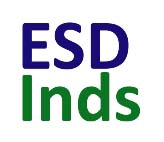ESDIns: The Development of Indicators & Assessment Tools for CSO Projects Promoting Values-based Education for Sustainable Development 
The aim is to develop useful indicators and assessment tools, which can be used by Civil Society Organisations (CSOs ) to measure the application of ethical values and their impact in the field of education of sustainable development.
ESDIns: The Development of Indicators & Assessment Tools for CSO Projects Promoting Values-based Education for Sustainable Development
Donor
the 7th EU Framework Programme
Project duration
2008 - January 2011
Project coordinator in CUEC
PaedDr. Tomáš Hák, Ph.D.
Project partners
- University of BrightonSD Coordination Unit
- Peoples Theater
- Alliance of Religions for Conservation
- Earth Chart Initiative
- European Bahá'í Business Forum
Project description
The important partners in non-formal education include non-profit organizations. These organizations focus in their regional, national and international activities on a number of target groups (e.g. general public, children and young people, firms and businesses) and deliver them a broad range of information in various fields - such as the economic, social, legal, consumer, health or environmental.
ESDInds project focuses on those non-profit organizations, which, to a greater or lesser extent, operate in accordance with the strategy of sustainable development. A strong link between the nongovernmental organizations involved in the project ESDInds is represented by the way they carry out their projects. The aim of these projects is while using value-oriented training for their participants to create values that allow a fulfillment of the principles and ideas of sustainable development. Such values include respect, solidarity, justice, integrity, tolerance, and more.
If we focus on indicators of sustainable development, or particularly of education for sustainable development at international, national or regional level, we find that in the vast majority quantitative indicators are used. They are able to describe a number of important aspects, both in the environmental, social (including various aspects of education) and economic field, however, they can not describe the change in values of people. This general level, which is required for these indicators, is not so easily and effectively achievable. However, it is different for projects of nongovernmental organizations, where the number of participants is usually limited (unlike the population of the region or nation), and where it is possible to apply other types of indicators beyond the quantitative ones.
The aim of the project ESDIns is to develop and verify such indicators or assessment tools that are able to describe the change in values of the participants after completion of various types of educational projects (courses, seminars, training, etc.) delivered by the non-profit organizations in the field of sustainable development. The development of these indicators (usually qualitative in nature) involves representatives of universities and NGOs. The result of the project should be a proposal of a limited number of indicators or assessment tools for describing and analyzing changes in the values of the participants of training courses, which could be used by non-profit organizations around the world. These indicators or assessment tools should, on the one hand, comply with the requirements for validity, reliability, objectivity and other aspects tied to the relevant indicators, but at the same time they should be easily applicable and interpretable in the daily practice of nongovernmental organization .
The ESDIns project consists of several basic stages:
1) methodological preparation of the project (monitoring of existing sustainable development indicators and indicators of education for sustainable development, methods of values measurement )
2) research on existing indicators at the level of nongovernmental organizations involved in the project (case studies)
3) selection of indicators of chosen values, design of the assessment tools and their testing in selected projects
4) dissemination of indicators or assessment tools between 50-80 organizations with a similar focus
Project outputs
[1] HARDER, Marie et al.Values-based Indicators for Sustainable Development: A handbook for Civil Society Organisations. 2009 (draft)



